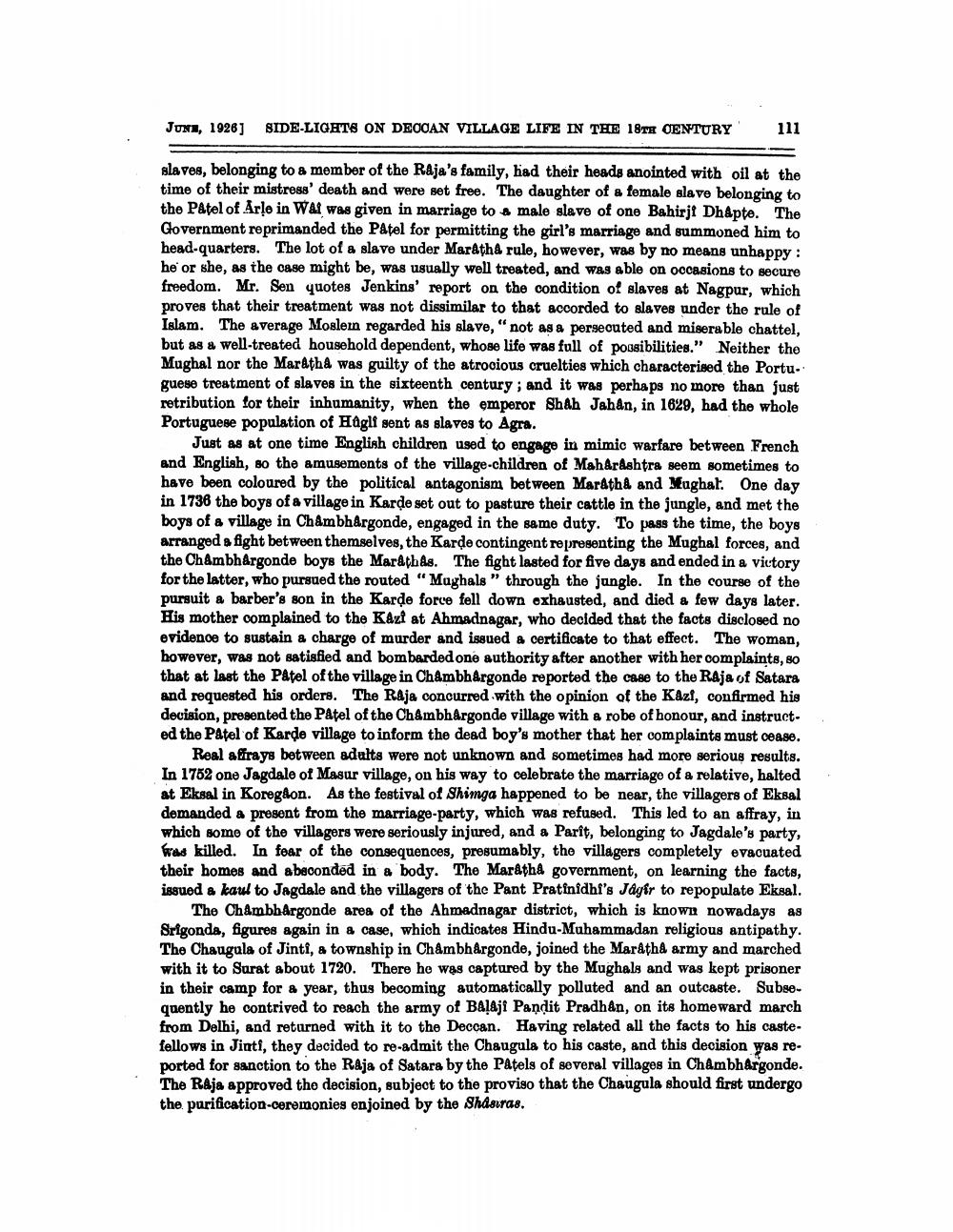________________
Jun, 1926]
SIDE-LIGHTS ON DECCAN VILLAGE LIFE IN THE 18TH CENTURY
111
glaves, belonging to a member of the Raja's family, had their heads anointed with oil at the time of their mistress' death and were set free. The daughter of a female slave belonging to the Patel of Arle in WAI was given in marriage to a male slave of one Bahirjt Dhapte. The Government reprimanded the Patel for permitting the girl's marriage and summoned him to head-quarters. The lot of a slave under Maratha rule, however, was by no means unhappy : he or she, as the case might be, was usually well treated, and was able on occasions to secure freedom. Mr. Sen quotes Jenkins' report on the condition of slaves at Nagpur, which proves that their treatment was not dissimilar to that accorded to slaves under the rule of Islam. The average Moslern regarded his slave, "not as a persecuted and miserable chattel, but as a well-treated household dependent, whose life was full of possibilities." Neither the Mughal nor the Maratha was guilty of the atrocious cruelties which characterised the Portu. guese treatment of slaves in the sixteenth century; and it was perhaps no more than just retribution for their inhumanity, when the emperor Shah Jahan, in 1629, had the whole Portuguese population of Hügli sent as slaves to Agra.
Just as at one time English children used to engage in mimic warfare between French and English, so the amusements of the village-children of Maharashtra seem sometimes to have been coloured by the political antagonism between MarathA and Mughal. One day in 1736 the boys of a village in Karde set out to pasture their cattle in the jungle, and met the boys of a village in ChambhArgonde, engaged in the same duty. To pass the time, the boys arranged a fight between themselves, the Karde contingent representing the Mughal forces, and the Chambhârgonde boys the Marathas. The fight lasted for five days and ended in a victory for the latter, who pursued the routed "Maghals" through the jungle. In the course of the pursuit a barber's son in the Karde force fell down exhausted, and died a few days later. His mother complained to the Kazt at Ahmadnagar, who decided that the facts disclosed no evidence to sustain a charge of murder and issued & certificate to that effect. The woman, however, was not satisfied and bombarded one authority after another with her complaints, so that at last the Patel of the village in ChambhArgonde reported the case to the Raja of Satara and requested his orders. The Raja concurred with the opinion of the Kazi, confirmed his decision, presented the Patel of the Chambhârgonde village with a robe of honour, and instruct. ed the Patel of Karde village to inform the dead boy's mother that her complaints must cease.
Real affrays between adults were not unknown and sometimes had more serious results. In 1762 one Jagdale of Masur village, on his way to celebrate the marriage of a relative, halted at Eksal in Koregaon. As the festival of Shimga happened to be near, the villagers of Eksal demanded a present from the marriage-party, which was refused. This led to an affray, in which some of the villagers were seriously injured, and a Parit, belonging to Jagdale's party, fras killed. In fear of the consequences, presumably, the villagers completely evacuated their homes and absconded in a body. The Marathe government, on learning the facts, issued a kaul to Jagdale and the villagers of the Pant Pratinidhi's Jager to repopulate Eksal.
The ChambhArgonde area of the Ahmadnagar district, which is known nowadays as Srigonda, figures again in a case, which indicates Hindu-Muhammadan religious antipathy. The Chaugala of Jinti, a township in Chambhårgonde, joined the Maratha army and marched with it to Surat about 1720. There he was captured by the Mughals and was kept prisoner in their camp for a year, thus becoming automatically polluted and an outcaste. Subsequently he contrived to reach the army of BA!Aji Pandit Pradhan, on its homeward march from Delhi, and returned with it to the Deccan. Having related all the facts to his castefellows in Jinti, they decided to re-admit the Chaugula to his caste, and this decision was reported for sanction to the Raja of Satara by the PAtels of several villages in Chambh Argonde. The R&ja approved the decision, subject to the proviso that the Chaugula should first undergo the purification-ceremonies enjoined by the Shasıras.




